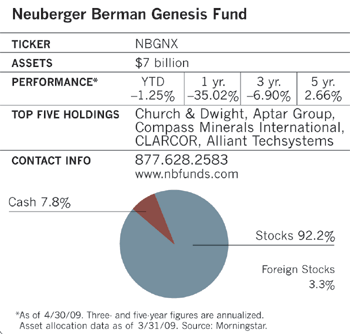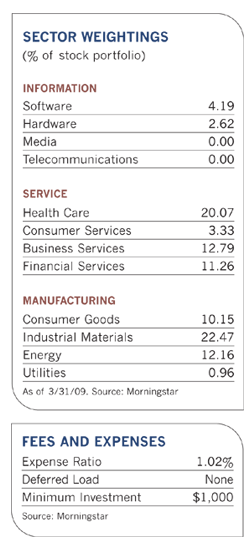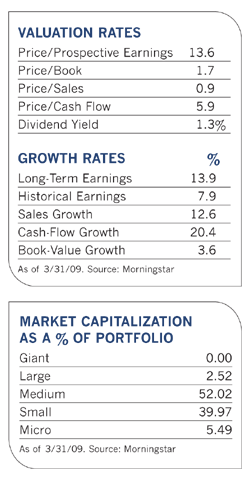About four years ago, Robert D'Alelio, co-manager of the small-cap Neuberger Berman Genesis Fund, had an uneasy feeling about the excessive leverage among consumers and the growing threat of a housing market bubble. His response was to pare down his portfolio positions in economically sensitive sectors such as financials and consumer discretionary stocks.
As it turns out, he made that call a couple of years early. Genesis fell behind the majority of small-cap funds as financial stocks climbed. The portfolio only came out near the top of the pack in 2007, when the credit crunch began to hit.
Given the continuing economic slide, the 51-year-old manager believes investors looking to move lower on the risk curve but still keep a foot in the small-cap door might find Genesis appealing. "Traditional wisdom says that small company stocks are at a disadvantage versus large companies now because higher financing costs and a slow economy hit them harder," he observes. While that may be true of the indexes, he says, the companies his fund invests in tend to follow a pattern of their own. They often boast significant free cash flow, they are not economically cyclical and they have defendable positions in industries posing high barriers to competitors.
Unlike many of his more aggressive small-cap competitors, D'Alelio likes to wade in the conservative end of the small-cap pool with companies that have established market niches, low debt levels and the ability to finance growth by reaching into their cash coffers. The stance has held this small company fund back when the market is roaring, but it has also helped in tough times. Over the long term, the formula has placed Genesis in the top 4% of Morningstar's small-company blend fund category for the three years ending April 15, the top 6% over five years and the top 4% over ten years.
Despite the fund's good relative performance, the market slide has shrunk its asset base from $10 billion at the beginning of last year to about $7 billion today. After a seven-year hiatus from taking in new investors, Genesis reopened its doors in January of this year to replenish a sagging asset base.
That decision comes as good news to Morningstar analyst David Kathman, who notes in a recent report that "this has long been one of the most attractive small-cap funds out there. The management team pays little attention to benchmarks and holds stocks for the long term, so that turnover is low and sector weightings often bear little resemblance to those of the fund's peers." In the current economic crunch, he adds, the fund has been helped by the manager's preference for niche stocks that generate lots of cash and don't have much debt.
Many fund holdings have below-market price-earnings ratios and above-average growth rates. Technology companies are absent-because of their short product cycles and because their industries have low barriers to entry-as are economically sensitive banks and real estate investment trusts. Companies must have a market capitalization of no more than $2 billion when D'Alelio buys them, although they are often much smaller. A typical small-cap fund's annual turnover rate is 100%, but Genesis' rate is 15% to 20%, which makes it possible for D'Alelio to handle the fund's large asset base without getting too overwhelmed.
Buying Opportunities
D'Alelio, a 30-year industry veteran, takes an opportunistic view of the extended bear market. He points out that the companies in the Russell 2000 Index most widely held by hedge funds are down roughly twice as much as those least-owned by the funds, a good indication that forced selling rather than fundamentals is driving prices downward.
"You can either pull your hair out trying to figure out where the market will go or look for stocks of recession-resistant, superior companies with defensible market shares," he says. "I'm choosing to do the latter because it's what we've always done."
Lately, he is finding investment opportunities among property/casualty insurers, which fill the financial sleeve of the portfolio in a way that minimizes credit risk. He believes the current credit crisis has reduced insurance industry capacity to write business, setting the stage for property/casualty insurers with the strongest balance sheets to participate in a price recovery.
"Property/casualty companies have their own unique cycles where pricing power drops for three to five years, then rises over a similar time frame," he explains. "Right now, they are moving toward the end of a down pricing cycle." After several major natural disasters, many insurers are short on capital and will need to raise premiums. One of Genesis' holdings, Validus Holdings, is a reinsurance company that provides capital for insurers short on cash. Because it was formed after Hurricane Katrina, its coffers have not been drained by natural disasters and it is in a position to provide capital to insurers that need it.
However, he remains extremely cautious about the financial sector and the economy in general. "Although the government has intervened to support the financial sector, considerable risk remains," he says. "Consumer balance sheets are stretched and the deleveraging process will take several years." On the other hand, he is more optimistic that the multiyear rebuilding of transportation, water and energy infrastructure both here and abroad will increase demand for industrial materials and commodities.
He also has a greater weight in energy stocks than the Russell 2000 benchmark. Although commodity prices and energy stocks have corrected sharply since mid-2008, D'Alelio believes the steep run-up in the first half of 2008 foreshadows further increases once the global economy stabilizes. "Energy producers have announced major reductions in capital spending that will dramatically reduce oil and natural gas supplies," he says. "At the same time, the per capita consumption of oil in China is 10% of what it is in the U.S. Even though demand is off now, supply-demand forces are going to push prices up over time." He believes that OPEC's efforts to decrease supply through coordinated voluntary cuts in production will be successful in bringing balance to the global oil market in the next year and set the stage for higher prices.
His current strategy reflects two dominant themes: He's avoiding overleveraged consumer plays and focusing on the beneficiaries of emerging market demand.
As part of the first theme, the fund has underweighted economically sensitive areas such as financial services and consumer discretionary for several years. Instead, the focus is on companies that can grow their businesses without a favorable tailwind, especially those involved in health care, consumer staples and defense.
In the health care sector, he avoids pharmaceuticals and HMOs in favor of veterinary and dental care companies. Idexx Laboratories, a maker of testing and diagnostic equipment for veterinary clinics, has benefited from the rising spending on veterinary care over the last few years and has a 30% to 50% market share in some areas of the country. Because pet owners must pay vet bills directly, the company does not have to deal with the reimbursement issues and pricing pressure associated with insurers.
Henry Schein and Patterson Companies, both longtime holdings in the dental equipment distribution business, also have secure niches in their fields. Although the two companies are expecting slower growth in 2009, they have such a large share of the market that competitors are unlikely to pose a threat. The increasing number of companies providing dental insurance as a benefit should also help insulate them from a sharp downturn in revenue.
The emerging market and infrastructure themes, meanwhile, point to D'Alelio's conviction that, despite recent economic setbacks, countries such as China and India will be powerful growth centers when their economies recover. "These emerging economies are still in the early phases of developing their industrial and transportation infrastructure," he says. "Demand for commodities such as oil, coal and natural gas will continue to grow, while consumers will demand a higher standard of living."
Competition from emerging market countries is also shaping some of his investment decisions. "You want to get in front of the things emerging market countries need and avoid the things they produce," he says. "That means focusing on U.S. companies that can satisfy growing consumer demand in emerging markets, but taking a pass on anything with a high labor component. U.S. companies find it extremely difficult to compete on that front because of low labor costs in emerging markets."
Two U.S. companies the fund holds in the agricultural area, Valmont Industries and Lindsay Corp., are positioned to benefit from the multiyear rebuilding of water infrastructure both here and overseas. The two companies also boast a duopoly on a product that others would find difficult to replicate-center pivot irrigation systems, which are complex systems designed to distribute water more evenly than traditional row-on-row flood irrigation. Both companies also have sizable infrastructure components. Lindsay, with a $400 million market capitalization, is a leading maker of large diameter tubing products. Valmont, which has a public value of $1.4 billion, makes support structures such as lighting poles and concrete highway barriers. The two companies sell their products in the U.S. as well as China.



